Select Language

By Satoshi Sugiyama and Tetsushi Kajimoto
TOKYO (Reuters) - Japan's economy contracted in the first quarter, squeezed by weaker private consumption and external demand and throwing a fresh challenge to policymakers as the central bank looks to lift interest rates away from near-zero levels.
Preliminary gross domestic product (GDP) data from the Cabinet Office on Thursday showed Japan's economy shrank 2.0% annualised in January-March from the prior quarter, versus a 1.5% drop seen in a Reuters poll of economists. It followed a slightly positive reading in the fourth quarter.
The reading translates into a quarterly contraction of 0.5%, versus a 0.4% decline expected by economists in the Reuters' poll.
Private consumption, which accounts for more than half of the Japanese economy, fell 0.7%, versus a 0.2% decline seen in the Reuters poll. It was the fourth straight quarter of decline, the longest streak since 2009.
Capital spending, a key driver of private demand-led growth, fell 0.8% in the first quarter, versus a decline of 0.7% seen by economists in Reuters' poll, despite hefty corporate earnings.
External demand, or exports minus imports, knocked 0.3 of a percentage point off first quarter GDP estimates.
Policymakers are counting on rising wages and income tax cuts from June to help spur flagging consumption.
The drag to growth from an earthquake in the Noto area this year and the suspension of operations at Toyota (NYSE:TM)'s Daihatsu unit are also expected to fade.
A sharp decline in the yen to levels unseen since 1990 has fueled concerns about higher living costs, squeezing consumption.
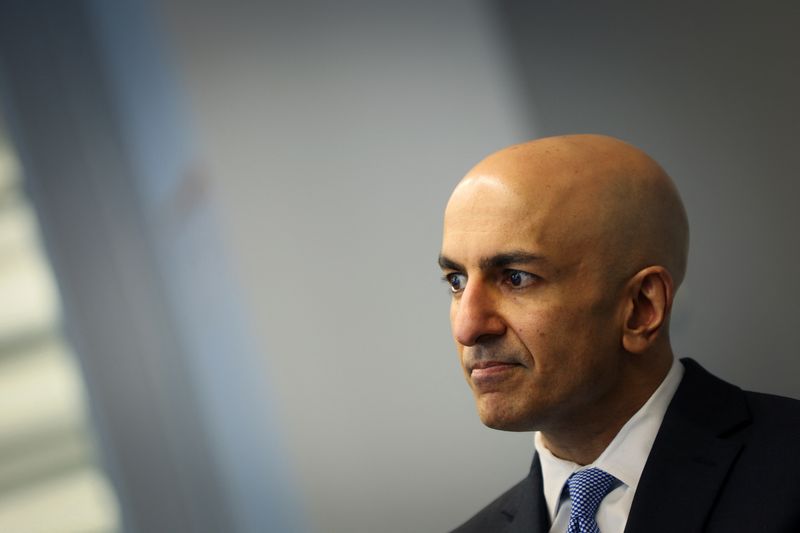
Investing.com -- Minneapolis Fed President Neel Kashkari on Wednesday backed the case for higher for longer interest rates after expressing uncertainty about how restrictive the current level of monetary policy is in the wake of more resilient than expected economy.
"The biggest uncertainty in my mind is how much downward pressure is monetary policy putting on the economy ... that's an unknown, we don't know for sure," Kashkari said Wednesday during a a moderated discussion at the 2024 Williston Basin Petroleum Conference in Bismarck, North Dakota.
"That tells me we probably need to sit here for a while longer, until we figure out where underlying inflation is headed," he added.
The current level of interest rates of 5.25% to 5.5% would normally be restrictive enough to slow the economy and inflation, but due pandemic-related distortions including a huge wave of fiscal spending, stimulus checks and other supportive measures have made the economy more resilience than the Fed had expected.
"It seems like there is more resilience in the economy than I had expected," Kashkari added. Because of some of these dynamics, these interest rates only really mean we're putting one foot on the brake and not two."
The remarks arrived just hours after the economic data showed the consumer price index slowed more than expected last month following three months of upside surprises. The slowdown in consumer prices came a day after a producer price inflation came in hotter than expected.
But on the heels of the hot producer price report, a "cooler-than-expected consumer price report has immediately eased concerns of rapidly rising inflation, fueling investors’ hopes for rate cuts in the coming months," Stifel said in a Wednesday note.
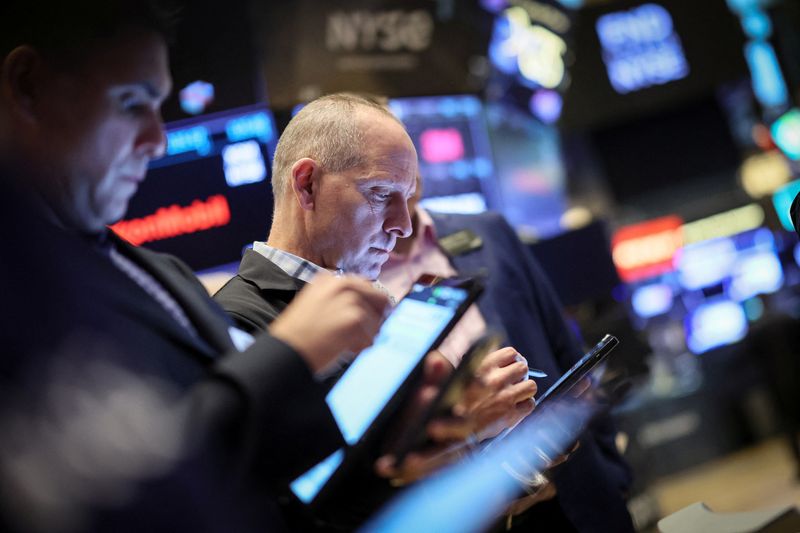
MILAN (Reuters) - Expectations over interest rate cuts rather than earnings optimism has made investors the "most bullish" since November 2021, Bank of America's monthly fund manager survey for May showed on Tuesday.
The survey of global fund managers with $562 billion in asset under management found 82% expect the first by the rate cut by the Federal Reserve in the second half, while 78% say a recession is unlikely over the next 12 months.
Cash levels fell to a 3-year low of 4% from 4.2% the previous months and stock allocation reached its highest since January 2022, the survey showed.

(Reuters) -Ride-hailing company Uber (NYSE:UBER) will acquire Delivery Hero's foodpanda branded takeaway business in Taiwan for $950 million in cash, the companies said on Tuesday.
Germany's Delivery Hero plans to additionally issue 8.42 million new ordinary registered shares which Uber has agreed to purchase for $300 million, the two companies said.
Following the move, Uber would hold around 2.98% of the Delivery Hero’s new share capital.
The companies aim to complete the transaction by the first half of 2025, they said, adding that following deal's closure foodpanda’s local consumers, merchants and delivery partners would be transitioned to Uber Eats.
The deal comes months after Delivery Hero said that talks regarding a potential sale of its foodpanda business in selected markets in Southeast Asia had been terminated.
($1 = 0.9271 euros)
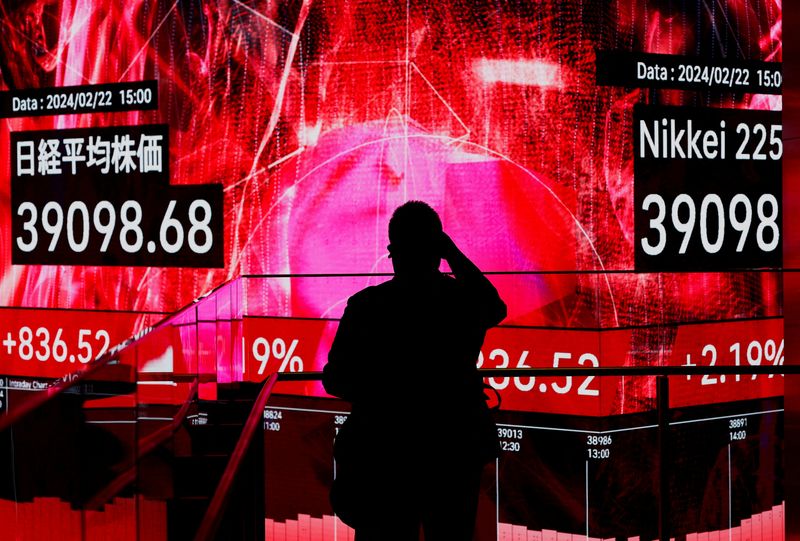
By Tom Westbrook
SINGAPORE (Reuters) - Asian shares hovered around 15-month highs on Tuesday and the dollar was firm ahead of highly anticipated U.S. inflation data, while Japanese bonds were squeezed as the central bank pulled back a little on its bond buying programme.
MSCI's broadest index of Asia-Pacific shares outside Japan climbed slightly and hit its highest since early 2023 in morning trade, as a strong rally in Hong Kong shares extended into a fourth consecutive week. (HK)
Japan's Nikkei was flat. Benchmark 10-year Japanese government bond yields rose one basis point to 0.95%, the highest yield since November, and five-year Japanese yields hit 0.555%, the highest since 2011. [JP/]
World stocks and the S&P 500 were steady overnight, poised just below record peaks. A survey released on Monday by the New York Fed showed Americans see inflation a year from now at 3.3%, higher than they did a month earlier, and later on Tuesday U.S. producer price figures will be closely watched.
Alibaba (NYSE:BABA) will most likely report results later on Tuesday.
The main focus this week is on Wednesday's actual U.S. CPI figures, to see whether some upside surprises in the first quarter were a blip or a worrying trend. Expectations are for core CPI to slow from an annual 3.8% in March to 3.6% for April.
"This would be good, but not enough to confirm Fed easing plans in (the third quarter)," Bob Savage, head of markets strategy and insights at BNY Mellon (NYSE:BK), said in a note to clients.
In the currency market, nerves and the inflation expectation survey were enough to keep the dollar from falling. Dollar/yen hit its highest since the start of the month, when traders reckoned Japanese authorities were intervening to buy yen.
The yen traded as soft as 156.4 to the dollar. The euro was steady at $1.0786 and the Australian and New Zealand dollars kept to recent ranges, the Aussie at $0.6606 and kiwi at $0.6015.
HANG SENG SURGES
In China, Hong Kong's Hang Seng index is up 30% from January's lows and has surged nearly 20% in a month.
News and data in recent days included a third straight monthly rise in consumer prices, better than expected imports data, record low credit growth and marketing of a trillion yuan in long-data special treasury bonds.
Investors see positive demand signals and signs that as monetary policy is reaching its limits, and with borrowers shy, authorities are planning to spend to support growth.
"Walking through the recent policy announcements, including the expansion of stock connect and encouraging leading enterprises to list in Hong Kong, it is hard not to come to the conclusion that top management in China intends to reinstate Hong Kong's role as an IPO hub," said OCBC analysts.
In New Zealand, inflation expectations have dropped, data published on Monday showed, and construction supplier Fletcher Building cut its outlook, citing a housing slowdown.
Fletcher's Australia-listed shares hit a two-decade low on Tuesday. Australia's government is expected to boast another surplus in its annual budget due on Tuesday.
Shares in bellwether Australian automotive equipment seller GUD leapt 9% after it forecast meeting expectations.
In Japan, the central bank announced its first cut to bond buying operations since December on Monday - a surprise hawkish signal to investors that drove selling in the market.
Two-year Japanese yields were untraded early on Tuesday but hit their highest since 2009. U.S. Treasuries were steady in Asia trade to leave 10-year yields at 4.49% and two-year yields at 4.86%. [US/]
The so-called meme stocks, which swung wildly after finding popularity in retail trading blogs and social media posts, leapt to life overnight after user "Roaring Kitty", credited with sparking the 2021 frenzy, returned to post on X.com.
Videogame store operator GameStop (NYSE:GME) rose 74%. Oil and gold were broadly steady with Brent crude futures at $83.40 a barrel and spot gold at $2,339 an ounce.
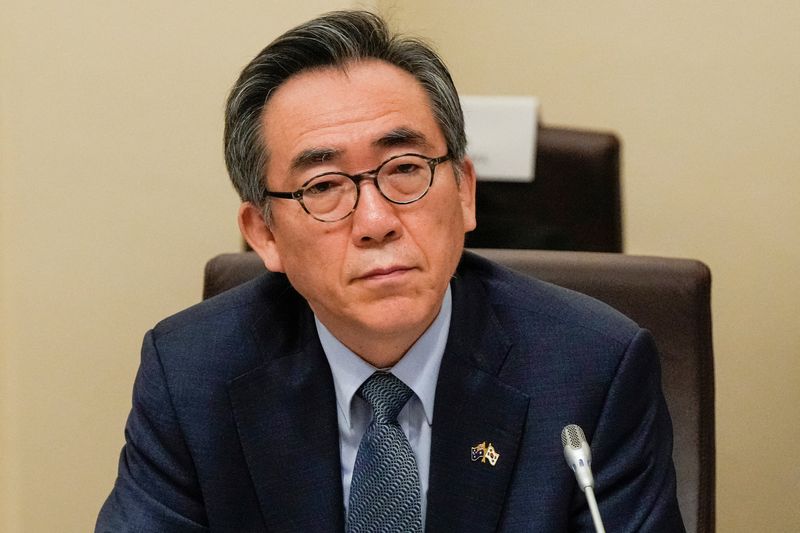
(Corrects paragraph 3 to clarify that Cho's trip is the first by a South Korean foreign minister to Beijing, not to China, in more than six years)
By Ryan Woo, Ju-min Park and Hyonhee Shin
BEIJING/SEOUL (Reuters) -China and South Korea should seek stable ties despite their recent "difficulties", Chinese Foreign Minister Wang Yi told his South Korean counterpart on Monday at a rare meeting in Beijing held amid tensions over Taiwan and other regional issues.
South Korea's Foreign Minister Cho Tae-yul said the countries needed to keep up momentum on cooperation and carefully manage ties, in a meeting that Cho's ministry said lasted for four hours.
Cho arrived in Beijing on Monday, his first trip to China since taking office in January, and the first visit to Beijing by a South Korean foreign minister in more than six years.
Relations between Beijing and Seoul came under new stress when South Korean President Yoon Suk Yeol said last year that democratically governed Taiwan, which China claims as part of its territory, was a "global issue", not just an issue between China and Taiwan.
Yoon added last year that the increased tensions around Taiwan were due to attempts to change the status quo by force, and he opposed such a change. China protested, saying the comments were "erroneous" and "totally unacceptable".
The Taiwan issue surfaced again in March when the island participated in a U.S.-backed democracy summit in Seoul. Beijing accused Seoul at the time of providing a platform for "Taiwan independence forces".
On Monday, Wang told Cho that China-South Korea relations had "faced difficulties and challenges, which are not in the common interest of both parties and not what China wants to see," according to a Chinese foreign ministry statement.
"It is hoped that South Korea will abide by the one-China principle, properly and prudently handle Taiwan-related issues, and consolidate the political foundation of bilateral relations," Wang added.
South Korea's foreign ministry did not mention Wang's Taiwan comment in its own statement.
TRILATERAL SUMMIT
Cho told Wang their countries should work together and "even if there are difficulties, momentum of cooperation should be continued while carefully managing the relations," according to the South Korean foreign ministry.
He added that they could continue to prepare for a summit of the leaders of China, South Korea and Japan in Seoul, planned for the end of May. The leaders of the three countries last met in China in 2019.
The Chinese statement made no mention of the summit.
Cho also called on China, as a permanent member of the U.N. Security Council, to play a constructive role for peace and stability on the Korean Peninsula, according to Cho's ministry.
Cho also asked for China's cooperation so North Korean defectors in China could go to their desired destinations without being forcibly repatriated to North Korea by Beijing.
China has long denied that there are any defectors from North Korea, which counts on Beijing as an ally, and says it follows the law when dealing people who enter its territory illegally.
ECONOMIC TIES
Wang and Cho agreed, according to their ministries, that the economic ties of the two countries had been a force in each other's development, and agreed to strengthen their cooperation, including the ensuring of stable supply chains.
Ahead of his talks with Wang, however, Cho had said that once mutually beneficial economic ties were seeing intensifying rivalry, and vowed support for businessmen seeking to harness market opportunities in China while minimising any accompanying risks.
On his part, Wang said he hoped China and South Korea could work together to promote stable relations and "eliminate interference", which he did not elaborate.
Chinese state media have reported that the differences between Beijing and Seoul were due to Yoon's leaning towards the United States, amid intensifying Sino-U.S. rivalry.
Yoon has also been vocal about the tensions between the Philippines and China in the South China Sea.
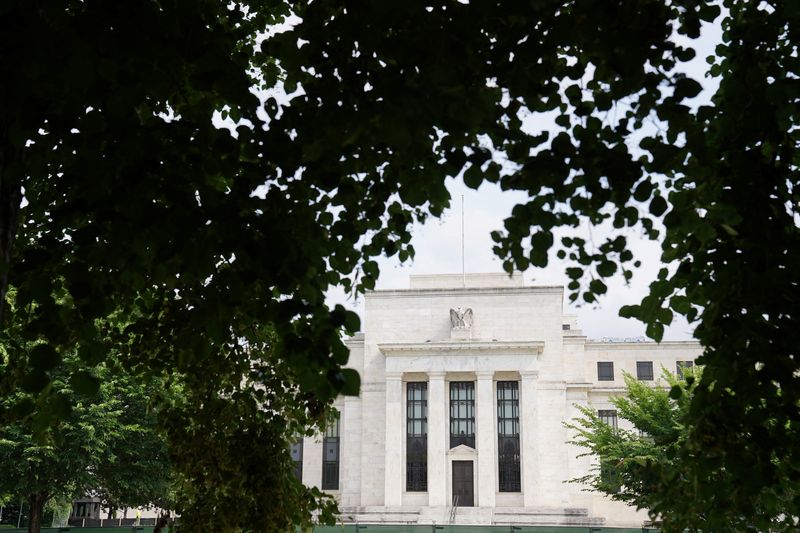
Investing -- The Federal Reserve is likely to cut rates twice this year starting in September, but if inflation data doesn't show enough of a slowdown by September, then the Fed is unlikely to deliver any cuts at all this year as there will be little chance of the data improving enough by year end.
"We think the base case is two cuts starting by September, and the next most likely outcome is none," ISI Evercore said.
The forecast comes as the market continues to debate whether one, two or no rates cuts are needed this year. Current market consensus continues to side with about two cuts for this year.
The two-rate cut camp believe in Fed chairman Jerome Powell's dovish thesis that monetary policy is restrictive, the recent upside surprises in inflation were backward looking, representing a blip along a bumpy road toward the 2% inflation target, and inflation will downshift at some point in the coming months, paving the way for September rate cut, Evercore ISI said.
"We think inflation downshifts in time for the Fed to cut in September and December," it added. But if the data hasn't improved enough by September for the Fed to cut, then it likely won't by December, all but ending the odds of any rate cut this year.
"The economic interpretation and base effects mean it would take a very sharp cooling in Q4 to keep 12-month inflation low enough for one cut in December. Otherwise: no cut before March 25," it added.
If the inflation data doesn't show enough progress, or specially year-on-year core PCE inflation treads water around 3%, absent of cracks in the labor market, then the Fed isn't likely cut at all until March next year, as the central bank's higher for longer policy would have had time to make a bigger impact on the economy and the base effects "start to work in the Fed’s favor again, with the hot January and February 2024 inflation prints dropping out of the year-on-year comparison," Evercore ISI added.
For the Fed to cut sooner than September, just about everything needs to go right, or badly quickly starting with the inflation data due out this week.
"April PPI and CPI would need to print at a level consistent with month-on-month core PCE inflation no higher than 0.20% and likely below 0.20, with good composition that lends additional confidence in order to put July seriously in play," it said, followed by very good May reports, too. "We think a pair of 0.17s for instance would ignite the case for July, while even a 0.23 would leave July deeply out of the money."
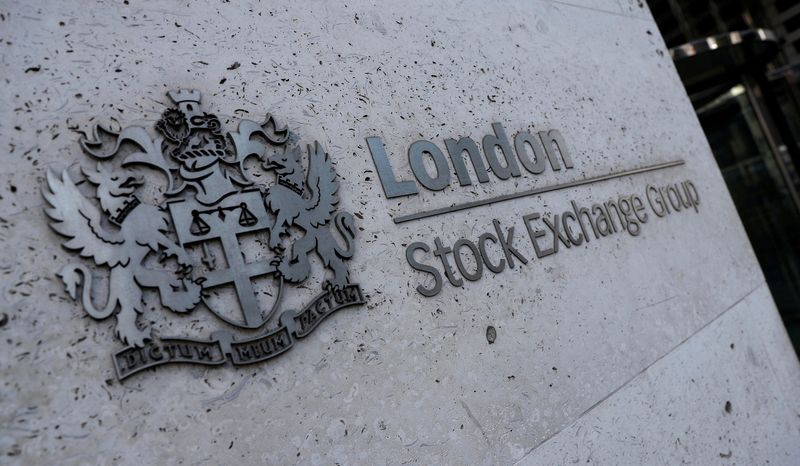
By Nell Mackenzie and Iain Withers
LONDON (Reuters) - Retail investors are pulling out of Europe's hedge fund industry, with assets under management shrinking to an eight-year low according to data released on Monday, as higher interest rates and lagging performance send smaller investors elsewhere.
Assets in alternative 'UCITS' funds in Europe shrank 3% to $236.3 billion at the end of March from three months earlier, according to research provider Kepler Absolute Hedge, which has data going back to 2016. The drop was faster than the 0.4% decline seen in the previous two quarters, Kepler said.
UCITS, or undertakings for collective investment in transferable securities, are a type of fund sold in the European Union which are heavily regulated to make them safer and more accessible to the public.
While UCITS have proved popular overall - accounting for 12 trillion euros ($12.9 trillion) of assets at end-2022, according to industry data - they have fallen out of favour with investors chasing higher returns.
"Hedge fund UCITS are rightly getting a lot of flak from investors lately. In fact, they increasingly strike me as an ice cube sitting in the sun," said Harald Berlinicke, partner at Sarnia Asset Management.
"As many investors have found out the hard way, handcuffing hedge fund managers by imposing tighter restrictions...may have defeated the purpose."
UCITS funds place restrictions on the leverage and risk-taking that enable other funds bought by institutional investors to juice up their returns.
In the first three months of 2024, UCITS funds tracked by Kepler averaged a 2.9% return compared with the 4.4% averaged by the wider hedge fund industry, according to research firm HFR.
Overall assets fell by $7.6 billion from alternative UCITS funds in the first quarter, mostly from multi-strategy, macro-economic and deals focused funds, while some hedge fund strategies like managed futures saw growth, Kepler's report showed.
Swiss private bank Julius Baer has been pulling client funds from UCITS hedge funds, according to a January client note seen by Reuters in which Chief Investment Officer Yves Bonzo cited poor returns and high fees, adding that offshore rivals had "systematically outperformed" them.
Julius Baer declined to comment.
Private equity giant Blackstone (NYSE:BX) closed its multi-strategy UCITS fund in November, after assets fell nearly 90% in four years.
($1 = 0.9295 euros)
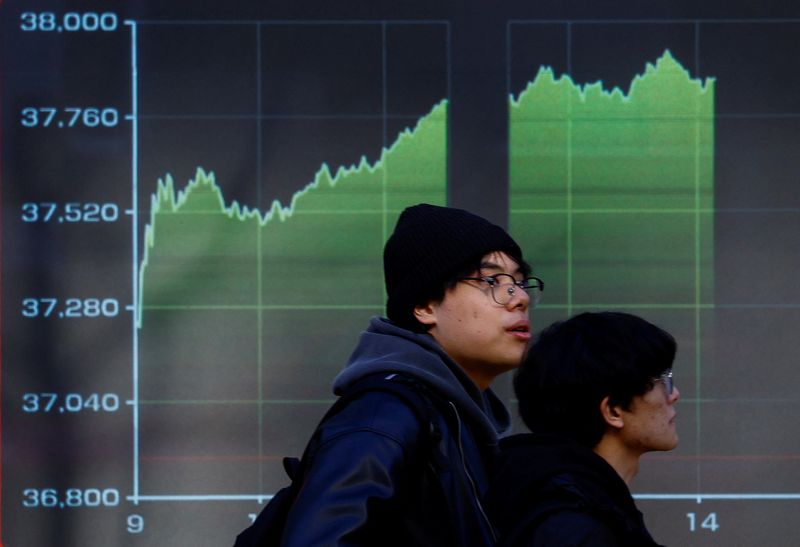
By Wayne Cole
SYDNEY (Reuters) - Asian shares crept to 15-month highs on Monday in a week where inflation figures could make or break hopes for earlier U.S. rate cuts, while Chinese activity data will test optimism about a sustained recovery in the world's No. 2 economy.
Beijing has already reported a welcome pickup in inflation to an annual 0.3% in April, helping to soothe worries about a slide into prolonged deflation. Forecasts favour further gains in April retail sales and industrial output due on Friday.
Chinese authorities are also set to sell 1 trillion yuan($138.24 billion) in longer-dated bonds to help fund stimulus spending at home.
The improved sentiment has helped lift Chinese blue chips to a seven-month high. The index was 0.1% softer on Monday with some sectors pressured by reports the White House was about to release details of new tariffs on Chinese goods.
MSCI's broadest index of Asia-Pacific shares outside Japan edged up 0.2%, after rallying for three weeks straight.
Japan's Nikkei was flat, still saddled with speculation further losses for the yen could lead the Bank of Japan to raise rates in the next few months.
The central bank sent a hawkish signal to markets on Monday by cutting the amount of Japanese government bonds it offered to buy in a regular operation, so pushing yields up.
Globally, much now depends on whether the U.S. April inflation report will show a moderation after three months of upside surprises. Median forecasts are for core consumer prices to rise 0.3% in the month, compared to 0.4% in March, pulling the annual rate down to 3.6%.
So crucial are the data that rounding to the second decimal place could make all the difference.
"Our unrounded core CPI forecast at 0.27% m/m suggests larger risks for a dovish surprise to a rounded 0.2% increase," noted analysts at TD Securities.
A low number would likely boost bets the Federal Reserve could ease as soon as July, which is currently priced at only a 25% chance. Equally, a high inflation print could push a rate cut out past September and challenge pricing for 42 basis points of easing this year.
Also due are figures on U.S. producer prices, retail sales and jobless claims, along with final reports on European inflation that should reinforce expectations for a June rate cut from the European Central Bank.
There are a host of Fed speakers this week to update markets on their thinking, including Fed Chair Jerome Powell who appears with the head of the Dutch central bank on Tuesday.
UPBEAT US EARNINGS
EUROSTOXX 50 futures were steady, while FTSE futures dipped 0.2%. S&P 500 futures and Nasdaq futures were both little changed early on Monday, after rallying last week as company earnings came in strong.
With 80% of the S&P 500 having reported results, companies are on track to have increased earnings by 7.8%, well ahead of the April expectation of 5.1%.
Once Nvidia (NASDAQ:NVDA) reports on May 22, Magnificent Seven quarterly earnings are on track to jump 49%, according to Tajinder Dhillon, senior research analyst at LSEG.
Companies reporting this week include Walmart (NYSE:WMT), Home Depot (NYSE:HD) and Cisco (NASDAQ:CSCO).
Global share indices have also bounced to record highs in recent weeks, even as markets have scaled back some of their more aggressive wagers for rate cuts this year.
"A straightforward interpretation of financial market performance is that there is more underlying strength in the global economy than had been anticipated and higher interest rates are reflecting rather than impeding global growth," says Bruce Kasman, head of economic research at JPMorgan.
"We lean in this direction as our 2024 growth and policy rate forecasts both move higher."
The relative outperformance of the U.S. economy continues to underpin the dollar, while only the threat of Japanese intervention is stopping it from re-testing the 160 yen barrier.
The dollar was holding firm at 155.92 yen on Monday, while the euro was flat at $1.0770 having faced resistance around $1.0791 last week.
Gold eased a touch to $2,358 an ounce, after rising 2.5% last week on demand from momentum funds and talk of persistent buying by China. [GOL/]
Oil prices faded late last week as U.S. gasoline and distillate inventories rose ahead of the start of the summer driving season. [O/R]
Brent was down another 22 cents at $82.57 a barrel, while U.S. crude dipped 17 cents to $78.09 per barrel.
($1 = 7.2339 Chinese yuan renminbi)

SEOUL (Reuters) - South Korea's financial watchdog said on Monday it was expanding and toughening the assessment of real estate projects in a bid to speed up restructuring of the sector.
House prices in South Korea have been falling since June, 2023, as high interest rates weighed on demand, and worries about debt repayments at construction firms have grown after a mid-sized builder's decision in December to reschedule its debt.
"Despite the recent rise in delinquency rates of real estate project financing amid a sluggish property market, there have been limitations to sort out unprofitable projects for an orderly restructuring," the Financial Supervisory Service said in a statement.
The delinquency rate of real estate projects climbed to 2.70% by the end of last year, up from 1.19% a year before and 0.37% at end-2021, according to FSS.
Under the new guidelines, which will come into effect from June, more loans and financial institutions will be subject to profitability assessments related to real estate projects with more detailed criteria for a better evaluation of risks.
The FSS said it would also tighten its supervision of financial institutions to make sure they take follow-up actions on real estate projects over default risk after assessments.
To help ensure a soft-landing for the real estate market, commercial banks and insurance firms have prepared a syndicated loan of one trillion won ($731.62 million). The funds will be used to ensure there is sufficient demand and liquidity during the restructuring process and the amount could be raised to a maximum of five trillion won if needed, the FSS said.

